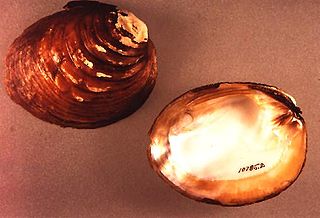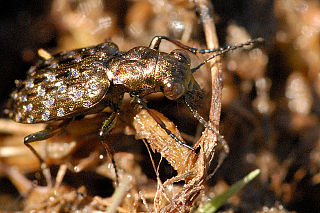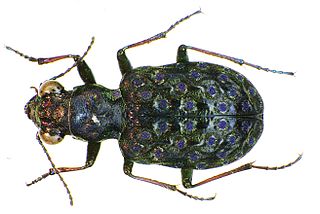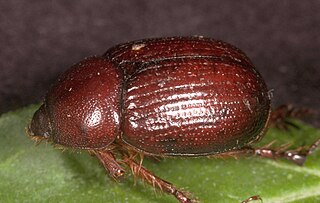
John Lawrence LeConte MD was an American entomologist, responsible for naming and describing approximately half of the insect taxa known in the United States during his lifetime, including some 5,000 species of beetles. He was recognized as the foremost authority on North American beetles during his career, and has been described as "the father of American beetle study".

Joseph Le Conte was a physician, geologist, professor at the University of California, Berkeley, early California conservationist, and eugenicist.

Mount Le Conte is a mountain located within the Great Smoky Mountains National Park in Sevier County, Tennessee. At 6,593 ft (2,010 m) it is the third highest peak in the national park, behind Kuwohi and Mount Guyot. It is also the highest peak that is completely within Tennessee. From its immediate base to its summit, Mount Le Conte is the mountain with the highest relief east of the Rocky Mountains, rising 5,301 ft (1,616 m) from its base, near Gatlinburg, Tennessee. For comparison, Pre-1980 Mount St. Helens in Washington was roughly 5,000 ft (1,524 m) above its base.

Elaphrus viridis, the Delta green ground beetle, is a species of ground beetle restricted to a small region within Solano County, California. Its color is a metallic-green, usually with bronze spots on its elytra, though some lack these spots. The lack or reduction of circular pits on the elytra helps distinguish it from other ground beetles. Typical adults are about a quarter-inch (0.6 cm) in length.

Tomarus is a genus of scarab beetles in the subfamily Dynastinae, the rhinoceros beetles. They are native to the Americas, where they are distributed from the central United States to Argentina, and a few species occur in the Caribbean.

Plethobasus cicatricosus, the white warty-back pearly mussel or white wartyback, is a species of freshwater mussel in the family Unionidae, the river mussels. Once widely distributed in the Ohio, Cumberland, and Tennessee River systems in the United States, its range has declined dramatically to the point of near-extinction. It is a federally listed endangered species of the United States.

Contes is a commune in the Pas-de-Calais department in the Hauts-de-France region of France.

Meloe is a genus of blister beetles commonly referred to as oil beetles. The name derives from their defensive strategy: when threatened they release oily droplets of hemolymph from their joints. This fluid is bright orange and contains cantharidin, a poisonous chemical compound. Wiping the chemical on skin can cause blistering and painful swelling of the skin. This defensive strategy is not exclusive to this genus; all meloids possess and exude cantharidin upon threat.

Lepturinae, the lepturine beetles, is a subfamily of the longhorn beetle family (Cerambycidae), containing about 150 genera worldwide. This lineage is most diverse in the Northern Hemisphere. Until recently the subfamily Necydalinae was included within the lepturines, but this has been recently recognized as a separate subfamily. Nine tribes are usually recognized today, with a tenth, Caraphiini, created in 2016. A few genera are of uncertain placement within the subfamily.

Elaphrus is a genus in the beetle family Carabidae. There are at least 40 described species in Elaphrus.

Elaphrus riparius is a species of ground beetle native to the Palearctic and the Near East. In Europe, it is found in Austria, Belarus, Belgium, Great Britain including Shetland, Orkney, Hebrides and Isle of Man, Bulgaria, Croatia, the Czech Republic, mainland Denmark, Estonia, Finland, mainland France, Germany, Hungary, Republic of Ireland, mainland Italy (doubtful), Kaliningrad, Latvia, Liechtenstein, Lithuania, Luxembourg, Northern Ireland, mainland Norway, Poland, Russia, Slovakia, Slovenia, mainland Spain, Sweden, Switzerland, the Netherlands, Ukraine and Yugoslavia.

Elaphrus cupreus is a species of ground beetle native to the Palearctic. In Europe, it is found in Austria, Belarus, Belgium, Bosnia and Herzegovina, Great Britain including Shetland, Orkney, Hebrides and Isle of Man, the Czech Republic, mainland Denmark, Estonia, Finland, mainland France, Germany, Hungary, the Republic of Ireland, mainland Italy, Kaliningrad, Latvia, Liechtenstein, Lithuania, Luxembourg, Northern Ireland, mainland Norway, Poland, Russia, Slovakia, Slovenia, Sweden, Switzerland, the Netherlands, and Ukraine.

Elaphrus uliginosus is a species of ground beetle native to the Palearctic realm. It is widespread but rare in Europe, and is absent from much of Southern Europe. It is a wetland and coastal species.

Trachyderini is a tribe of long-horned beetles in the family Cerambycidae. There are at least 140 genera and 650 described species in Trachyderini.
Elaphrus laevigatus is a species of ground beetle in the subfamily Elaphrinae. It was described by John Lawrence LeConte in 1852.
Elaphrus olivaceus is a species of ground beetle in the subfamily Elaphrinae. It was described by John Lawrence LeConte in 1863.

Ligyrus is a genus of beetles in the tribe Pentodontini, from the Americas. It was originally erected by Hermann Burmeister in 1847, then merged with the genus Tomarus, then restored by M.M. López-García and C. Deloya in 2022.

Sphenophorus is a genus of weevils, often known as billbugs, in the family Curculionidae, and tribe Sphenophorini. Eleven species of billbugs infest managed turfgrass in North America.
Batrisodes is a genus of ant-loving beetles in the family Staphylinidae. There are at least 80 described species in Batrisodes.















